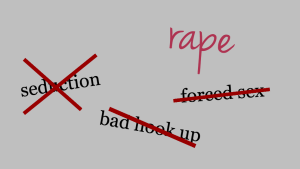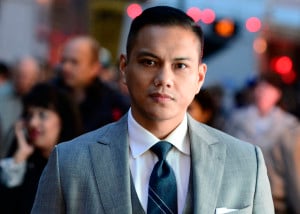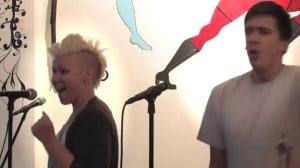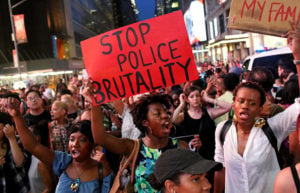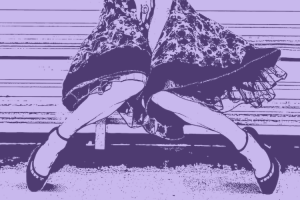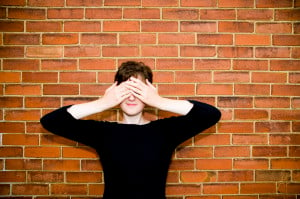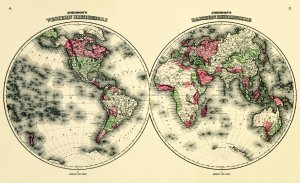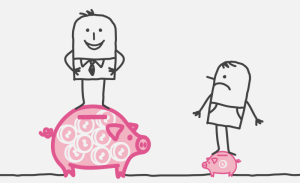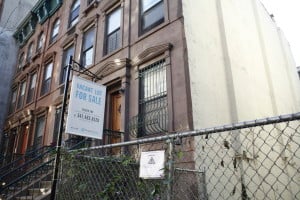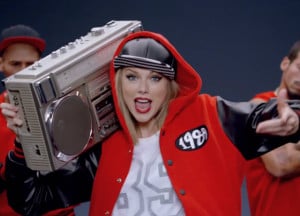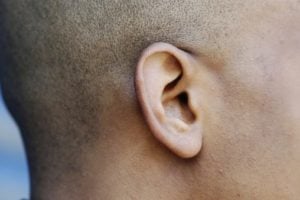
Source: Huffington Post
Originally published on Bluestockings and cross-posted here with their permission.
I have been drafting this letter since I was ten. I am 20, and tonight is the first night I will write these words outside of me.
I don’t know what they will look like here. Honestly, I am scared to see them uncoiled and still damp from the sweaty palms that have enclosed them for a decade. I am so accustomed to holding fistfuls of aching, rambunctious words around you, Dad.
More than anything, I wish you would ask me to open my hands and actually listen to what you see, what I say, what you hear.
But that is not how we work, is it?
I give you the words you don’t know how to ask for. We know all our scripted prompts for loving cautiously. We are used to trafficking in glass blown conversations. I will not, I cannot, do this with you anymore. I love you too much for this, so listen.
Dad, you are a white man.
I know this might come as a shock because people do not tell you this too often. You are not approached on the street, in the movies, at the workplace, and ordered to explain your race so strangers can “read” you properly and treat you accordingly.
You have both the privilege and the curse of living in the unmarked, white blind spot of the American racial imaginary. If you have enjoyed living there, departing only to return comfortably home to White every night, I’m afraid you have a problem.
Me. I am your problem.
I am the brown-bodied child with the boisterous curls who colored your mother’s whitewashed scrapbooks and inspired obnoxious inquiries about our relationship and your paternity whenever we were out together.
I am the “ethnically ambiguous” woman who strategically reads Gayatri Spivak in your kitchen while you bob along to James Taylor and bake batches of blueberry scones.
I patiently wait for your questions, longing for the flurried attentiveness I was once greeted with when I read Nancy Drew, Little Women, and all the other innocuously white narratives that populated my childhood.
I am your problem, Dad. You are the white father of a black daughter. You are accountable to a life that is squarely outside of the jurisdiction of the whiteness that swaddles you. I should be the problem that won’t let you come home white and blissfully unaware, but somehow this is not the case.
Somehow, you feel like a white man first and my dad second. You asymmetrically toggle between the two, coming into focus as one only to obscure the other.
I have always known you were white, Dad, at least on a descriptive level. I did not see you as a “white heterosexual male” with all the privilege this historically and institutionally connotes until your whiteness started hurting me.
Do you remember the first time I went to a black hair salon? I had been begging Mom to take me because I knew that the black women there could wrangle curls and kinks into lustrous, silky sheets.
Black salons were in the business of making black hair beautiful. I remember thinking, at twelve years old, that my transformation would be even more successful because I was already halfway to “beautiful.” I was half white, right?
You came to pick me up at the salon, even though I begged Mom to come instead. You showed up early and came inside, even though I explicitly told you not to. They were not finished, and you made a fuss. You demanded that we leave mid-metamorphosis – half straight, half curly.
I ushered you out the front door, with my head to the ground, determined not to be the weak, temperamental, easily excitable halfie. I couldn’t let these “real” black women see me cry as I apologized to them for allowing a white man into their sacred space. It was theirs, not mine. You were mine, you were a white man, and I was a liability.
We drove home listening to a Spanish radio station, drowning the magnitude of our silence in a language neither one of us speaks, even though your mother’s, my grandmother’s, maiden name is Garcia. She married an Irish-German man and did not allow her children to touch her name. I had to find it for myself. Garcia was not given to me, I had to fight for it.
That was the first night you became a white man to me, Dad.
Sitting beside you, hair undone, body stolen from a black rite of passage, I felt shame. I felt like a black girl to your white man and for a moment, race eclipsed us and we fell out of kinship, slipping from father and daughter into strangers.
Dad, since then you have flickered. You are swallowed by whiteness and become racially inaccessible to me the moment my race comes to the fore. When I become Black Girl, you become White Man, and we are not each other’s anymore.
In fifth grade, Josh Michaelson told me that he only liked white girls. Dad, I wanted to ask you if you left Mom because she was black. According to Josh Michaelson, white men did not think black women were beautiful. I watched you date white woman after white woman, marry a white woman and have a white baby.
I wanted to ask you if you felt safer with them, like they were the real deal, and we were just practice.
When our bodies were assaulted with disapproving stares in New Orleans as we walked down the street together, I wanted to ask you if you ever wished we were the same race so we wouldn’t have eyes lingering on us everywhere. I felt ashamed that we could not give each other anonymity and privacy.
When I was 15 and followed home by a black man who repeatedly called me a “high-yellow whore” and proceeded to sexually harass me for blocks, I walked in the front door crying and told you my phone had been stolen. I didn’t want to watch your face when I said the words “high yellow,” and they did not even register as a racial epithet to you.
I could not ask you these questions and share these experiences with you, Dad, because you were implicated as a white man, I was implicated as a black girl, and I felt like we could not speak from these places.
If we did, I thought we would stay there, mired in race, and become unrecognizable as father and daughter. I could not risk losing the ability to claim you as my person.
Dad, I know this is hard to hear, so please bear with me.
You are the Dad who stayed up late on school nights with me and baked pie while we listened to Tracy Chapman and I talked incessantly about books you have never read. You are the Dad who cries every Christmas Eve when you drive us back to Mom’s house at midnight.
I will always stay in the car with you a little longer, hold your hands, and assure you that you are loved and that nothing about our family is broken, even if I don’t know that I believe this.
You are the Dad who went to Pride parades before you knew I was queer and obnoxiously pointed out adorable “LGBTQ” couples once you knew I was. When I walked down the stairs with my girlfriend before prom, you took so many photos, I had to ask you to tone it down.
Before we left, you hugged me and said, “I cannot believe you have a girlfriend and everything now. I feel like you don’t need me anymore.”
You told me that she was “something special,” and I was so grateful that you saw that and you were happy for me. You made me feel like having a girlfriend was not a detour or a departure from growing up the “right” way.
Dad, there is an abundance of goodness in our relationship. This is undeniable. You are a good man, and a good father, but all this good cannot continue to make up for the race we cannot touch.
I am so tired of slipping into black and out of daughter whenever race is evoked.
I need for you to meet me as your daughter, as your daughter of color, all at once. We cannot keep evacuating our bodies to love each other. We cannot simply ignore the way our bodies are policed and politicized as antithetical, irreconcilably raced when we stand side by side.
I wish we could have collaboratively prepared for the day when I saw you as a white man for the first time and wondered what that made me. What does it mean to come from whiteness into a brown body? We have allowed whiteness to become an unmarked specter, Dad.
My whiteness is a gossamer ghost that haunts me, lightening my skin, softening my curls, coursing through me wordless and unaccountable for its actions. An acquaintance asked me once, upon finding out that I was half white, what it felt like to have a colonized body.
I was speechless. I wanted to stand up for white and call it loving. My white could not be “colonizing,” but I did not know what else to call it, really. I wish you had taught me another word for white.
Dad, when you decided to have children with a black woman, what did you imagine your role would be in nurturing these children’s racial identity and self-confidence? I think you expected Mom to be solely responsible for transmitting race to us because she was the black parent. What could you, the white parent, contribute, right? What could you have done?
You could have checked your own whiteness. You could have acknowledged that you were the husband of a black woman and the father of mixed children and considered the implications of this.
You loved a black woman and helped make black children; your relationship with us should have made your home of invisible whiteness impossible to inhabit. If you don’t live there anymore, Dad, I would like to know. I have been given no indication that you have left.
You could have talked to me about race, Dad. You should have been part of the conversations I had with Mom about slavery and the Civil Rights Movement. If you thought your presence would have been an imposition, you were wrong. I interpreted your absence as a sign that you had nothing to say and no stakes in these issues.
I needed to hear you speak to learn how to speak about my race. You are not unmarked and the whiteness you gave me is not either, even if we operate as if it is. I would not be writing this letter if this were true.
Where do we go from here? I am sure that is what you want to know, because you are a fixer. Talk to me, Dad. Read this letter and do not expect me to start the conversation. Come to me. It is your turn. Go.
***
To learn more about this topic, check out:
- 10 Learned Behaviors of a Black Girl
- 9 Things Everyone Needs to Stop Saying to Black Women Immediately
- The Good, The Bad, and The Ugly in Navigating a Multicultural Relationship
- More Than a Theory, More Than a Trend: Making Your White Anti-Racism a Lifestyle Commitment
[do_widget id=”text-101″]
Kelsey Henry is a senior at Wesleyan University, an abortion doula, disability justice advocate, and burlesque dancer. She is writing a thesis about growing old as a queer time and cannot decide if she wants to be a midwife or a professor when she grows up. In the meantime, she wants to read more Zadie Smith, love well, and build a chair with her bare hands. You can check her out on Twitter @khomotextual.
Search our 3000+ articles!
Read our articles about:
Our online racial justice training
Used by hundreds of universities, non-profits, and businesses.
Click to learn more
Most Read Articles
- « Previous
- 1
- …
- 30
- 31
- 32






